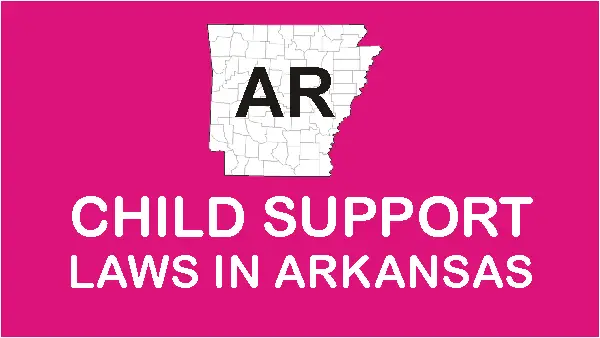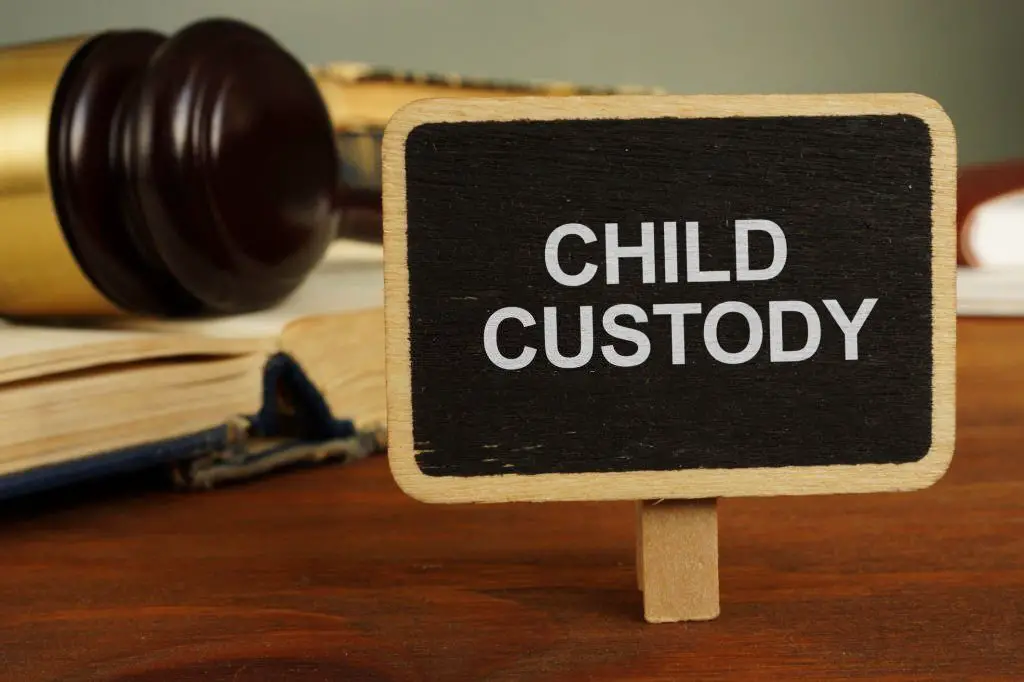
The laws governing child support in Arkansas are different from that of other states. AR child support law sets how much the child maintenance should be, and the duration of such payments, plus it seeks to guide parents in exceptional cases such as deviation, support for disabled children, and retroactive support.
As you may already know, child support (or child maintenance) is a continuous monetary payment made by a spouse to another spouse, guardian, caregiver, or the state for the upkeep of children after a divorce or separation.
The person who is required to pay child support is referred to as the “obligor,” whereas the person who is eligible to receive child maintenance is referred to as the “obligee.”
What is AR Child Support Laws?
In Arkansas, the obligee is typically always the person who has primary custody of the child, which means the person who lives with the child, pays the majority of the living expenses, and has primary custody of the child.
The obligor is typically always the spouse who doesn’t have primary custody of the children and may or may not have custody or access to them.
The Arkansas child support laws are described in Administrative Order No 10, of April 2, 2020, and the Office of Child Support Enforcement within the Arkansas Department of Finance and Administration is responsible for enforcing them (OCSE).
An Order of Support can be requested by custodial parents, non-custodial parents, and non-parental guardians.
What does Child Support Cover in Arkansas?
The goal of the child support system is to make sure that the child maintains an adequate living standard. Child support is intended to cover a wide range of expenses and in Arkansas, these costs include food, clothes, medical care, school fees, entertainment, extracurricular activities, and so on.
Unless the child’s fundamental requirements are not being addressed, the court will not ask the receiving parent to show where the money is going. Sometimes, the non-paying parent may not be certain what the payment should cover. Child support payments in AR are meant to cover the following:
- Basic needs – food, clothing, shelter
- Medical care
- Education-related expenses – supplies, extracurricular activities
- Childcare
- Basic transportation and travel expenses
- Entertainment – access to computers, television, games, Internet, etc.
- Activities such as summer camp, sports, etc.
- College expenses
Child Support When One Parent Lives Outside Arkansas
To enforce child support orders beyond state boundaries, each state has to have the Uniform Interstate Family Support Act (UIFSA) in place. Arkansas is no exception.
The UIFSA ensures that child support processes and procedures are consistent across states. When one spouse lives in another state where the Arkansas courts do not have authority to adjudicate or enforce orders, UIFSA reduces these bottlenecks.
As a result of the UIFSA, an AR child support attorney can take legal action against a spouse who now lives in another state to enforce a child support order.
How is Child Maintenance Calculated In Arkansas?

Learn How Child Maintenance Calculated In Arkansas
To calculate child maintenance, Arkansas adopted the Income Shares Model and moved away from basing all child support obligations primarily on the non-custodial parent’s income.
The earnings of both parents are considered in this model. The amount of your combined income that the child or children will require to cover basic living expenses must first be determined by the court.
Let’s imagine your monthly gross income is $4,000 and your ex-monthly spouse’s gross income is $2,000. Both of you make a total of $6,000 per month in gross income. The amount of child support required for each child has been calculated, and you can find it by looking at the new 2020 Child Support Chart HERE.
Let’s assume that both you and your ex-partner only had one child together and make a total of $6,000 per month in income. The child will require $815.00 per month to cover their essential needs, according to the chart.
Your share of the $6000 monthly income you give will determine how much child support you must pay. Therefore, if you provide $4000 of the total $6000, you are accountable for $543.28 every month, or 66.66 percent of the $815.
The non-custodial parent provides the custodial parent money in the form of child support, while the custodial parent spends her or his percentage directly toward the child’s requirements.
Support is assumed as a percentage of income if a parent’s income is higher than those indicated on the chart:
15% for a single child
21% when there are two kids
25% when there are three kids
28 % when there are four kids
30% when there are five kids
32 percent when there are six or more kids
For parents who work for themselves, income is guessed based on tax records from the preceding year. In rare circumstances, if the payer is voluntarily under or jobless, income may also be assumed to be higher.
The calculation can be done easily using the Arkansas Child Support Calculator or Child Support Worksheet.
Arkansas Child Support Calculator or Worksheet: Which to Use?

How to determine Net Income for AR child support
While a child support calculator can be used to estimate child support, it is not a guarantee of the final amount of child maintenance that the judge will order. A child support worksheet is a form used by the AR courts (or negotiating spouses) to approximate the basic child support obligation of the parents.
Regardless of which approach you use, spouses can decide on a child support sum and amend the worksheet accordingly to ensure it accurately reflects their agreement. Both establish a presumption duty to pay child support.
The final decision on the amount of child support is made by the administrative law judge, administrator, or court.
Gross Income Included in Calculating Child Maintenance
For child support calculation purposes, gross income includes:
- all wages and salary, including commissions, military pay, tips, overtime, and bonuses
- self-employment income
- interest and dividends
- net rental income from property the parent owns
Even jobless parents are likely to have some sources of income, like:
- severance pay
- unemployment benefits
- retirement benefits
- veterans’ benefits
- disability benefits, or
- workers’ compensation awards.
An AR family court judge may also allocate an income value to parents who do not currently have income-earning employment (like a second house). If a jobless parent inherits assets that can be sold, for instance, the judge may include the property’s market value as a part of such parent’s income.
Where parents willfully go unemployed or underemployed in order to avoid paying child support, judges may infer (assign) income based on what they are supposed to be earning.
Is Medical Health Insurance Part of Child Support in Arkansas?

Medical Health Insurance and Child Support in Arkansas
Yes, in addition to the amount of support determined by the guidelines in Arkansas, the parents will be responsible for the child’s health and dental insurance.
Whereas the noncustodial parent is presumed to provide coverage, this can readily be transferred to the other parent if it makes good sense.
For instance, suppose the custodial parent’s employer offers healthcare insurance for the dependent but the noncustodial parent does not.
Factors Arkansas Courts Consider Before Ordering Maintenance
The following factors must be considered by the court when determining whether Arkansas Family Code applies:
- The age of the child and needs; the parents’ ability to assist
- Financial resources available to the child
- For a set period of time, you have custody and access to a child.
- An increase or decrease in the obligee’s earnings or income due to the obligee’s property and assets
- Child care expenses incurred by either parent in order to keep a job
- any other children under the care of either party
- Any other children under the care of either party
- What kind of alimony or spousal maintenance is being paid or received;
- Obligor or obligee receives an automobile, house, or other benefits from his or her employer or business entity.
- The parties or the child’s special education, health-care, or other expenses
- The cost of traveling to obtain custody of and access to a child.
- Cash flow from any estate and assets, including real estate, personal property, and business property, can be positive or negative.
How to Challenge or Modify Child Support Order
A parent may request a modification (update) of an existing child support order every 3 years if the noncustodial parent’s gross income changes by 20% or more, or by more than $100 monthly. A parent may also ask the judge to alter a child support order if there has been a significant change in circumstances since the original order was made
Steps to Collect Child Support in Arkansas

Steps to Collect Child Support in Arkansas
Getting a child support order in place is only half the struggle in Arkansas. You’ll also have to collect the money itself. A noncustodial parent is responsible for paying the full amount of child maintenance per month as imposed by the court.
Where can you submit a child support claim?
In general, the circuit court is where you can bring a child support lawsuit. Ark. Code § 9-14-105
Additionally, the Office of Child Support Enforcement might be able to offer assistance and direction during this procedure.
Here are the 3 ways for getting child support in AR
1. Go to Forms and Publications and click Request for Services
2. Pick up an application from a local office (The list is here).
3. Request an application by phone from a local office or by calling 501-682-8398
Your application will be sent to the proper local office for consideration after they receive it and the $25 application fee, if necessary. You will be notified when the case is begun, and you might be contacted if more information or paperwork is required. After submitting your finished application, you can anticipate hearing from us within 30 days.
Who Can File for Child Support?
Any one of the below may file for the child support from the parents of the children in Arkansas:
- the parent with custody;
- any individual or organization who has the child’s physical custody;
- a minor child via their guardian or any adult who is not related to them but has a close relationship with them (referred to as “fictive kin”);
- A petition against the non-supporting parent(s) may be filed by a child over the age of 18 to whom support was owed while the kid was a minor; or
- when a parent, presumed father, or person with physical custody is receiving support through a government program or is receiving child support services, the Office of Child Support Enforcement should be notified.
Ark. Code § 9-14-105
Arkansas Child Support Services Office, Number and Login Portal
Office of Child Support Enforcement (OCSE)
Office Locations – http://www.dfa.arkansas.gov/Pages/ocseOffices.aspx
Email – sdu.customers@ocse.arkansas.gov
Phone – 1(866) 428-8382
Fax – 1(501) 683-7912
Mailing Address – OCSE, P.O. Box 8133, Little Rock, AR 72203
Child Support and Arrears
The Arkansas statute of limitations on back child support payments (arrears) is five years past age 18 for any arrears that have not been adjudicated. Adjudications are valid for ten years and may be reviewed every ten years thereafter. Judgments automatically renew for ten years each time there is a payment.
Consequences of not paying child support orders in Arkansas
If the noncustodial parent consistently fails to make court-ordered support payments, their licenses, including their driver’s license and any occupational or professional licenses, may be suspended, money may be taken from their bank accounts, or the court may find them in contempt of court and sentence them to jail.
A “contempt citation,” which indicates that a judge has found the parent disregarded a court order, will be issued in the state for willful refusal to pay child support.
How to Enforce Child Support Arrears in AR
Courts have a variety of other options besides contempt for dealing with uncooperative parents. Any of the following orders may be given by judges::
- a “withholding order,” which transfers money from the non-paying parent’s paycheck to the paying parent for child support up to the value of child support plus 20 percent for late payments.
- a court order to garnish a deadbeat parent’s bank account in order to withdraw money
- a lien being placed on real estate owned by a deadbeat parent, such as a home or land
- sale of personal property, such as a car or truck, and establishes a lien against it to pay child support
- instruction for the custodial parent’s legal fees and other expenses incurred while attempting to get child support
- an order that requires a defaulting parent to pay child support to the custodial parent out of public assistance or state Medicaid.
If you feel the arrears are being demanded wrongly, you can learn how to get child support arrears dismissed HERE.
How to Pay Child Maintenance in Arkansas

How to Check Child Support Payment History in AR
In Arkansas, parents can pay child maintenance in a variety of ways, as long as your order doesn’t state otherwise:
- by debit or credit card,
- mail,
- check
- bank transfer
- direct deposit
- income withholding, or
- auto-draft from a bank account.
How to Check your Child Support Payment History in AR
When there are disagreements between the parents and a need to confirm how much money is owed, child support payment records are extremely beneficial.
If you are unclear about your case number, contact the Arkansas Child Support Clearinghouse at 1-866-428-8382 or your local office to learn more about each payment method.
When Does Child Support End in Arkansas?
The Arkansas court “may order that one or both parents to support a child until:
- the child is 18 years or until either the child graduates from high school or the end of the school year before the child turns 19, whichever comes first.
- the child emancipates by getting married,
- the child is declared an adult by the court
- the child is disabled and unable to support himself, or
- the child dies.
Nevertheless, if the judge determines that the child is disabled (physically or mentally) and unable to support himself, the child can receive support perpetually.

Understanding Custody Rights of a Child in Arkansas
How Does AR Child Support Work if one Parent Has no Job?
The court may take into account whether a non-custodial parent is underemployed out of choice or not if that parent reports being unemployed or underemployed. The parent may have income imputed to them if the court finds that they are working below their maximum earning potential without good reason.
Is Child Support Tax Deductible in Arkansas?
NO. In Arkansas, child support payments are neither taxable to the recipient nor tax-deductible by the payer as stated by the IRS. Don’t include child support payments when calculating your gross income to see whether you have to file a tax return.
However, either parent may be eligible for a dependency exemption per child. If the parents can’t agree on who receives the exemption, the judge will set out the terms in a court order.
Getting a Skilled Arkansas Child Support Attorney
If you are involved in a family law matter in Arkansas, you may have a lot more questions than answers at this moment. You are not alone; Correspondence with members has shown that using the services of specialized child support attorneys saves a lot of hassles and most importantly, ensures you come out as a winner for you and your kid.
If you need to fight your child maintenance cause in AR with confidence, then you’ll need attorneys that are both empathetic and strong.
Luckily, we have compiled a database of these expert child support lawyers and made them available for the convenience of our members. You can reach them at the click of a button for legal advice and representation on child maintenance.
Arkansas Resource
- Arkansas Child Adoption Guidelines
- Arkansas Childcare Guidelines
- Arkansas Child Custody and Visitation Guidelines
- Arkansas Child Support Guidelines
- Arkansas Divorce Guidelines
- Arkansas Marital Property Guidelines
- Arkansas Spousal Support Guidelines
- How to Check Arkansas Child Support Payment History
Click Here to Get our Free Arkansas Alimony recommendation.
Child Support Laws in all 50 States
A - Alabama | Alaska | Arizona | Arkansas
C - California | Colorado | Connecticut
D-H - Delaware | Florida | Georgia | Hawaii
I - Idaho | Illinois | Indiana | Iowa
K-L - Kansas | Kentucky | Louisiana
M - Maine | Maryland | Massachusetts | Michigan | Minnesota | Mississippi | Missouri | Montana
N - Nebraska | Nevada | New Hampshire | New Jersey | New Mexico | New York | North Carolina | North Dakota
O - Ohio | Oklahoma | Oregon
P-S - Pennsylvania | Rhode Island | South Carolina | South Dakota
T-U - Tennessee | Texas | Utah
V-W - Vermont | Virginia | Washington DC | Washington State | West Virginia | Wisconsin | Wyoming





